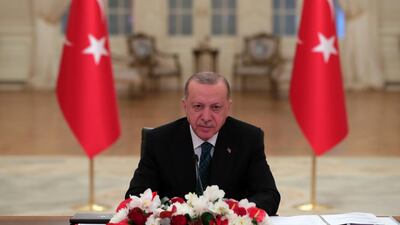President Joe Biden called his Turkish counterpart Recep Tayyip Erdogan on Friday, a day before Biden becomes the first US leader to recognise the mass atrocities perpetrated against Armenians by the Ottoman Empire as genocide.
In a readout of the call, the White House said the two leaders will meet in June at the Nato summit in Brussels.
“President Biden spoke today with Turkish President Erdogan, conveying his interest in a constructive bilateral relationship with expanded areas of co-operation and effective management of disagreements,” the White House said.
“The leaders agreed to hold a bilateral meeting on the margins of the Nato Summit in June to discuss the full range of bilateral and regional issues.”
The call to Ankara, which came 93 days after Mr Biden took office, focused on a host of bilateral and regional issues as the two Nato allies continue to be engaged in an increasingly complex and contentious relationship.
Turkey has said that recognising the Armenian genocide would only worsen its fraught ties with the US.
On Wednesday, Washington notified Ankara it had been excluded from the new F-35 fighter multinational agreement, in line with actions the US has taken to penalise Turkey for acquiring the Russian S-400 anti-aircraft system.
Ryan Bohl, a Middle East expert at the intelligence analysis group Stratfor, saw Mr Biden’s call as an attempt to soften the blow of the US recognising the genocide.
"The call is an attempt by Mr Biden to keep ties from straining too much after the genocide recognition. Turkey will be outraged and many will want to see Mr Erdogan take a strong stand against the White House," Mr Bohl told The National.
The call provides Mr Edogan a subtext that “he stood up to Biden, which would be politically valuable, without changing much in overall US-Turkey ties".
Mr Bohl said both sides are motivated to move past the Armenian genocide recognition and focus on areas of co-operation including Afghanistan, Covid-19 vaccines and trade.
He added the call took some time to come because the White House is conducting a review of bilateral relations.
“Mr Biden held off on the call because the administration was still deciding on their approach to Turkey, ranging from the Armenian Genocide, to the S-400 acquisition, to Turkey's policies in Syria and beyond," Mr Bohl said.
“There didn't seem to be a good reason to call Ankara until the administration had at least signalled some of its positions."
Mr Biden's predecessor Donald Trump frequently called Mr Erdogan to discuss Syria and legal cases against Turkish bank Halkbank.
Mr Erdogan pleaded with Mr Trump personally to interfere and drop the Halkbank case in a call in 2019.
According to John Bolton's memoir The Room Where It Happened, Mr Trump told his Turkish counterpart he would intervene to dismantle the case.
Despite the delay in Mr Biden's call, US Secretary of State Antony Blinken met with his Turkish counterpart Mevlut Cavusoglu last month and US special representative to Afghanistan Zalmay Khalilzad has made at least one trip to Ankara.
The Biden administration is leaning on Turkey to help in the Afghanistan troop withdrawal set for September 11 and in peace talks with the Taliban.
Turkey is set to host an international peace conference for Afghanistan in mid-May.


